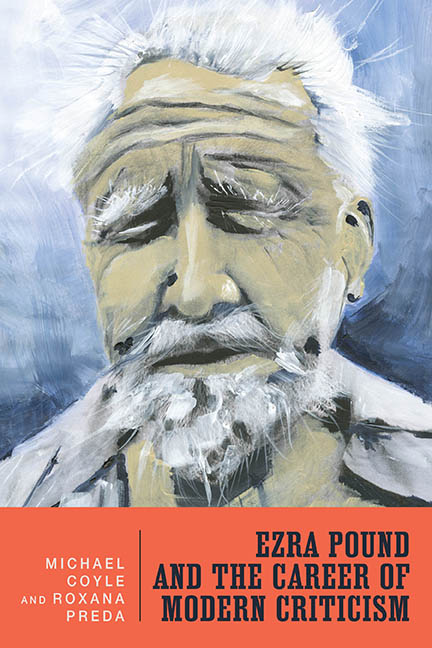Book contents
- Frontmatter
- Dedication
- Contents
- Preface
- Acknowledgments
- 1 From Wabash to Washington, 1907–1947
- 2 A Prize Fight and Institutionalization, 1948–1951
- 3 Kenner, Watts, and Professional Attention, 1951–1961
- 4 Sailing after Knowledge, 1962–1971
- 5 The Pound Era and Its Monumental Companion, 1971–1985
- 6 Pound Studies and the Postmodern Turn, 1980–1990
- 7 Reading Pound in the New Millennium, 1990–2016
- 8 The Many Lives of Ezra Pound: Biographies and Memoirs, 1960–2015
- 9 Educating the World: Periodicals on Ezra Pound, 1954–2017
- Conclusion
- Chronology of the Bollingen Controversy
- Works Cited
- Index
5 - The Pound Era and Its Monumental Companion, 1971–1985
Published online by Cambridge University Press: 17 July 2019
- Frontmatter
- Dedication
- Contents
- Preface
- Acknowledgments
- 1 From Wabash to Washington, 1907–1947
- 2 A Prize Fight and Institutionalization, 1948–1951
- 3 Kenner, Watts, and Professional Attention, 1951–1961
- 4 Sailing after Knowledge, 1962–1971
- 5 The Pound Era and Its Monumental Companion, 1971–1985
- 6 Pound Studies and the Postmodern Turn, 1980–1990
- 7 Reading Pound in the New Millennium, 1990–2016
- 8 The Many Lives of Ezra Pound: Biographies and Memoirs, 1960–2015
- 9 Educating the World: Periodicals on Ezra Pound, 1954–2017
- Conclusion
- Chronology of the Bollingen Controversy
- Works Cited
- Index
Summary
One way by which a poem might be thought The most prevalent critical assumption among sympathetic readers of the Cantos has been that their significance and form are hidden in an iterative and kaleidoscopic pattern for the assiduous and intelligent to discover. This assumption stems from Pound himself, but it was first articulated in Hugh Kenner.
—Leon Surette, A Light from EleusisThe Pound Era
THE CONFIDENCE THAT FORTY YEARS AGO enabled Hugh Kenner to announce “The Pound Era” is almost unthinkable today. While it was Kenner's The Poetry of Ezra Pound (1951) that had first found the terms to successfully present Pound as candidate for academic status, The Pound Era (1971) attempted to define modernism with Pound at its very center. What is remarkable is not that Kenner failed, but that he came as close as he did to realizing at least part of his ambition. The twenty years that separated his two books is less than half of the time that separates The Pound Era from our own moment, but in many ways academe has changed less in these forty-plus than it did in the twenty years following the Bollingen controversy. The Pound Era was published at precisely the moment that poststructuralist criticism was beginning to shake the foundations of the Anglo-American academy, and though Kenner's paratactic presentation at the time struck many as partaking in that disruption of New Critical hegemony, it had in fact nothing to do with it. For all his stylistic pyrotechnics, Kenner was decidedly old school, still adhering to formalist insistences on the hegemony of the author's text. For all of his contextualizing forays into science, art, economics, and history, the emphasis of Kenner's title was on “Pound” and not on “the era.”
Two decades into the next century Kenner's book still remains the benchmark against which all others are measured. Thus, in 2008, when reviewing the latest in a succession of unsatisfactory literary surveys of modernism for the pages of the New Yorker (which in 2007 had a decidedly un-academic circulation of 1.062 million readers), Louis Menand still closed with a reference to The Pound Era.
- Type
- Chapter
- Information
- Ezra Pound and the Career of Modern CriticismProfessional Attention, pp. 95 - 106Publisher: Boydell & BrewerPrint publication year: 2018

